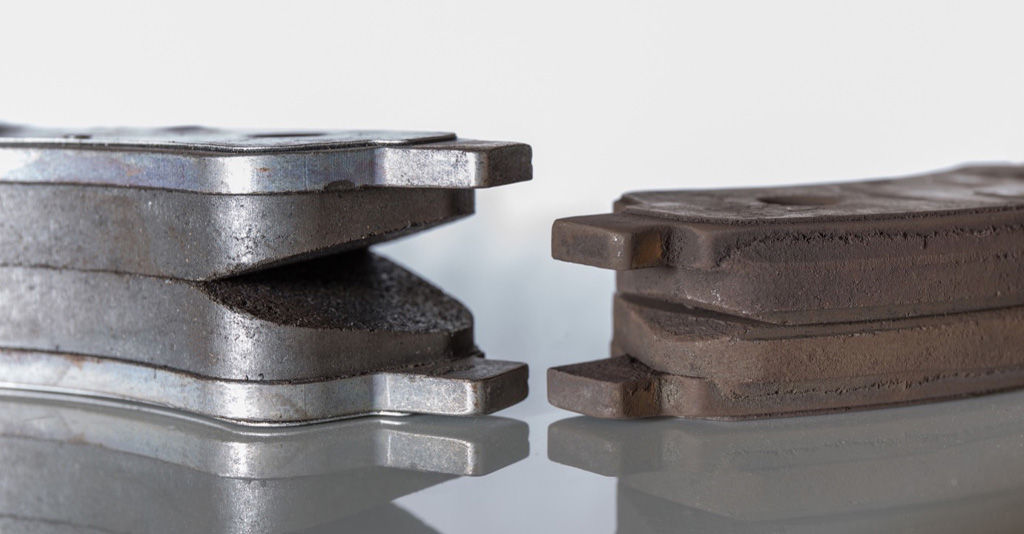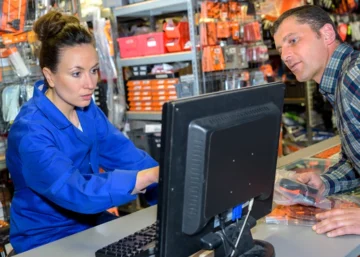
Ensuring a vehicle’s braking system is in working order is crucial to your customers’ safety. So, a thorough assessment of the vehicle’s brake pad wear is a must. Keep reading for some tips and tricks from our expert techs when it comes to diagnosing brake pad wear and how to remedy some common potential issues.
Look
The very first thing you’ll do when the vehicle is up on the hoist is perform a visual inspection, which if done thoroughly and correctly, can help you easily identify a pad wear issue if it’s present.
As you make your way around the vehicle, check each pair of brake pads and shoes for things like uneven pad wear and rust or other environmental contaminants. You’ll also check the rotors for signs of overheating, like grooves, scoring and warping.
Each brake pad has a minimum thickness measurement as defined by the manufacturer, which indicates the specifications for the maximum wear that the pad can endure before being considered unsafe to drive on. As you know, each pad’s minimum thickness differs, so review the specifications for the brake pads currently installed on the vehicle.
Another visual indicator that brake pads have worn out is usually reported by the customer – an illuminated brake indicator light on the instrument panel. You know that this light can mean a few different things, but pairing this information from the customer with your visual inspection can help you quickly and efficiently work out a diagnosis before you even need to pick up a tool!
Listen
If signs of brake pad wear aren’t immediately visible or obvious when you complete your visual inspection, there are a few things you can listen for during your test drive. Are the brakes giving off a squealing, squeaking or grinding noise? Let’s dive into what each of these sounds can mean:
Squeaking or Squealing Noise
You’re hearing this noise for a reason! As a technician, you know that brake pads often have steel clips included in their construction to serve as a wear indicator. If the act of pressing down the brake pedal results in a squeaking or squealing noise, your customer’s brake pads are likely worn past their prime and need to be replaced immediately. Make sure to take this opportunity to educate your customer on the importance always bringing their vehicle into the shop if they hear unusual noises, especially when depressing the brake pedal. By encouraging your customer to stay on top of service and maintenance, you can help ensure that their vehicle stays in good working order, and also help them avoid costly additional repairs – like rotor replacement as a result of driving on thin brake pads for too long.
Grinding Noise
If the customer’s brakes are giving off a grinding sound when you put your foot to the brake pedal, you may be dealing with a larger brake system issue. This sound often happens when the brake pad has worn so thin that the brake rotor is coming into contact with the caliper. In this situation, the rotors and calipers are at risk for damage, as well as the brake pads. You’ll need to let your customer know that their brake pads need to be replaced right away to prevent further damage, and that there is a chance that rotors or calipers might need service or replacement, too.
Feel
During your test drive, check for proper pedal feel when depressing the brake pedal. Is the vehicle taking longer than normal to reach a complete stop? Do you feel a vibration in the steering wheel or below the driver’s seat during braking? These can both be symptoms of worn out brake pads, or other issues with the braking system. If you feel any of these abnormalities, you can use that information to help you make an accurate diagnosis.
Final Checkpoints
Based on look, sound and feel, you might assess that the vehicle’s brake pads have worn thin and need replacement, but don’t forget that other brake system parts like calipers and rotors may have been damaged depending on how long the pads were driven on in this state.
At ADVICS, we always recommend replacement of brake pads and brake rotors together, to ensure that the vehicle is always equipped for a safe, smooth and reliable stop every time. You can feel good recommending ultra-premium brake parts like ADVICS brake pads to your customers, knowing that our brake pads surpass the competition in testing for noise, pedal feel and pad life, according to SAE standard measurements.



